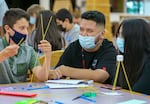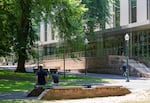Senior year of high school can be an exciting time — prom, senior trips, huge graduation parties. But for many students who graduated last year, with the class of 2020, the ongoing pandemic took that excitement away and replaced it with stress and uncertainty.
Some 2020 high school graduates ended up forgoing college plans, and, in turn, many Oregon colleges and universities were hit hard with falling enrollment. For students who didn’t immediately enroll in college after high school, many remain hesitant to attend this fall with risks and questions surrounding the highly contagious delta variant of the virus.
Dale Delacruz is one of many students who finished high school in the midst of the pandemic last year and didn’t go to college — even though he’d been planning to.
“I was working on my [financial aid application] before all of it happened,” he said of the pandemic. “I’d always come to the college career room and try to get some help, and then COVID hit and I just stopped working on it.”
Instead of applying to college, Delacruz, 19, went straight into the workforce — first working at a food processing company, and eventually returning to North Salem High as a coordinator for the school’s Pacific Islander club and as a tutor.

Dale Delacruz, 19, center, works with North Salem High School’s incoming freshman, Christian Rodriguez, 14, left, and Dynashaye Ybarra, 14, right, during an orientation on July 28, 2021. Delacruz took a gap year after graduation, and worked as an instructional assistant at North Salem High for a year, and plans on attending Chemeketa Community College this fall.
Kristyna Wentz-Graff / OPB
“I just thought, ‘Well, I might as well make money since I have nothing else to do,’” Delacruz said.
He said working with students at North Salem has been rewarding, but it’s also made him realize how unprepared he feels for eventually taking the plunge into higher education.
“I wish I did go to school just because it would keep me up to date when it comes to helping kids, and like homework and stuff,” Delacruz said. “So that’s one thing I really regret. I just wish I went straight to school, but it’s fine. I’ll get back into it.”
According to data from the National Student Clearinghouse, nearly 7% fewer high school graduates in 2020 immediately enrolled in college compared to class of 2019 graduates.
That compares with a drop of 1.5% between the 2018 and 2019 classes.
Although there isn’t yet statewide data available for college-going 2020 Oregon high school grads, generally both community colleges and public universities in the state saw enrollments dip during the pandemic.
‘Summer melt’ and changing plans
Some of Oregon’s largest public universities felt the brunt of uncertainty during the pandemic in the form of “summer melt” — the phrase college officials use for students who apply and are accepted to college but don’t enroll.
“Last fall, we saw 238 students — significantly more than in previous years — who were admitted to OSU, but who deferred their enrollment to a later time,” said Oregon State University’s Vice President of University Relations and Marketing, Steve Clark.
Clark said it’s unclear at this point just how many of those students will enroll for this fall.
The University of Oregon saw something similar, but declined to provide OPB with specific numbers.
“In 2020 we received a substantially higher number of students requesting to defer their admission for a year,” UO’s Vice President for Student Services and Enrollment Management, Roger Thompson, said. “While numbers are not finalized, we expect to welcome a large number of them to our incoming class of Ducks this fall.”
Both OSU and UO allow those deferring students the option to keep scholarships for enrollment at a later time.
Emielle Nischik is the Executive Director of College Possible Oregon, a nonprofit focused on preparing low-income students for college and supporting them when they get there.
Nischik said College Possible actually saw more of its students go on to college in 2020 compared to 2019, but many of them were changing plans at the last minute.
“Maybe they were planning to go out of state. Maybe they were planning to go to a four-year university,” she said, “They changed their plans and decided to stay closer to home or go to community college… We saw that happening so late into the fall.”
Nischik added: “Last year felt really chaotic for students. It was just a lot to navigate.”
Still uncertainty during the pandemic
As a summer transition coach with College Possible, part of Erick Padilla’s workload is supporting students who graduated from high school last year and didn’t immediately enroll in college.
Padilla said it’s been hard reaching out to students during the summer, when many are on vacation, and what he’s learned has come indirectly from other College Possible coaches who’ve connected with 2020 graduates who didn’t go straight to college. Padilla said they have specific reasons for not wanting to be in college right now.
“They don’t want to attend college during the pandemic,” Padilla relayed. “They don’t feel that that’s safe for them and for their family.”
Along with 2020 graduates, Padilla works with young people throughout the state who graduated as recently as this summer and as early as 2015. He said although College Possible has had a lot of success helping students get to college, many are still dealing with the complications the pandemic has brought.
“Even though we are in this pandemic, I can see their desire to go to college,” Padilla said. “I can see their difficulties as well.”
Nonprofit director Nischik said it’s still a little too early to know if “summer melt” will be a big problem this year, though she has also heard some students are nervous about what this fall could bring.
“Unfortunately, as the delta variant is ramping up, we’re hearing from students that they’re feeling a little bit more hesitant again,” Nischik said. “I think we’re on a really good trajectory this summer and now we’re starting to have some of those conversations, real concerns around what’s going to happen.”
Some campuses see gap year enrollment bounce
Though many schools in the state are still in the process of finalizing their enrollment for the fall, some have said they are seeing students eager to come back.
Portland State University said it is seeing a substantial increase of “gap year” students applying.
PSU Vice President of enrollment management Chuck Knepfle said the university has seen 46% more gap year students apply this year when compared to 2019, prior to the pandemic.

Portland State University Campus
Hanin Najjar / OPB
Some private institutions, which start classes earlier than public universities, have said they are seeing higher or even record enrollment compared to past years — some of that coming from students who deferred in 2020.
North Salem High graduate Delacruz plans on starting at Chemeketa Community College this fall, and although he has some regrets about not going straight to college after high school, he said he’s hopeful to potentially have more in-person opportunities than he probably would have had last year.
“I’d rather go in-person because I’m a huge visual learner, and I just like socializing with people too in general. I just like building my relationships with teachers,” Delacruz said.
Overall, Delacruz said having support, from both his family and people at North Salem High School, has been crucial for him in preparing for college.
“I got a lot of teachers here, like resources that can really help me,” Delacruz said. “We even have a tutoring zone and my coworkers are always telling me, ‘If you ever need help with [school] work, just let us know and we’ll get you back to it.’”
Delacruz plans on majoring in psychology, and after Chemeketa he may go to Portland State. But after the uncertainty of the last year and a half, he said he’s keeping his options open.
